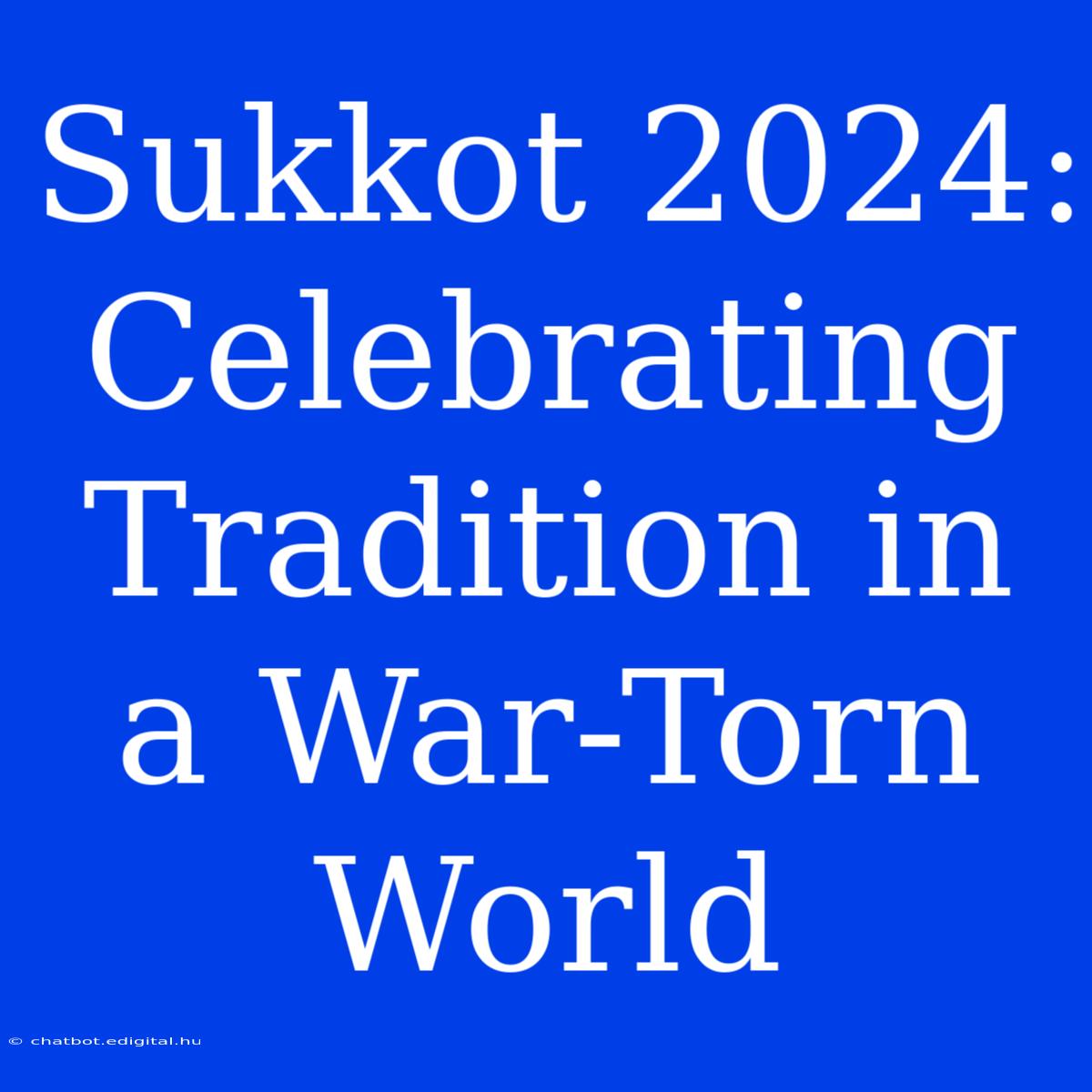Sukkot 2024: Celebrating Tradition in a War-Torn World
What is Sukkot, and how can it offer solace in a time of conflict? Sukkot, the Jewish Festival of Tabernacles, is a time of joy, reflection, and connection to our heritage. But in a world grappling with war and instability, its message of hope and resilience takes on a profound significance.
Editor Note: Sukkot 2024 promises to be a poignant occasion, offering a space for reflection and strength in the face of global challenges.
Understanding the complexities of war and its impact on communities is crucial, as the festival's traditions offer a powerful reminder of our shared humanity and the importance of seeking peace.
Analysis: This article explores the multifaceted nature of Sukkot in a world marked by conflict. It delves into the origins and rituals of the festival, while examining its relevance to contemporary issues like displacement, resilience, and the pursuit of peace.
Key Aspects of Sukkot in a War-Torn World:
| Aspect | Description |
|---|---|
| Historical Context | Sukkot's origins lie in the Israelites' journey through the desert, a testament to resilience and faith. |
| Symbolism | The sukkah, a temporary dwelling, embodies vulnerability and dependence on God's protection. |
| Social Justice | The festival emphasizes sharing and hospitality, extending compassion to the vulnerable. |
| Hope & Resilience | Sukkot's message of hope provides comfort and strength to those enduring hardship. |
| Spiritual Connection | Connecting with tradition through rituals like the four species strengthens faith and community. |
Sukkot
The Festival of Sukkot, also known as the Feast of Tabernacles, is an ancient Jewish tradition celebrating the Israelites' journey through the wilderness after their exodus from Egypt. It is a time to commemorate their reliance on God's protection and provision, and to reflect on the fragility of life and the importance of community.
Key Aspects of Sukkot:
Sukkah:
- Introduction: The sukkah, a temporary dwelling constructed with a roof of foliage, is the central symbol of Sukkot. It represents the Israelites' shelter in the wilderness and serves as a reminder of God's constant presence.
- Facets:
- Construction: The sukkah must be built with a minimum of three walls and a roof of natural materials like branches or leaves, allowing for a view of the stars.
- Symbolism: The sukkah symbolizes vulnerability, fragility, and the need for dependence on a higher power.
- Purpose: The sukkah provides a space for communal meals, prayer, and reflection on the transient nature of life.
Four Species:
- Introduction: During Sukkot, Jews hold and wave four species - the lulav (palm branch), etrog (citron), hadass (myrtle branches), and aravah (willow branches).
- Facets:
- Meaning: Each species represents a different aspect of Jewish tradition and the human experience.
- Ritual: The four species are held together and waved during specific blessings, signifying unity and the interconnectedness of all creation.
- Symbolism: The lulav, etrog, hadass, and aravah symbolize different aspects of Judaism: righteousness, joy, love, and humility.
Social Justice:
- Introduction: Sukkot is a time of hospitality and generosity, emphasizing the importance of caring for the vulnerable and sharing our resources.
- Facets:
- Ushpizin: The tradition of welcoming guests, known as "ushpizin," embodies the festival's commitment to hospitality.
- Tzedakah: Giving charity and supporting those in need are integral aspects of Sukkot, strengthening community bonds and fostering compassion.
- Social Responsibility: Sukkot reminds us of our responsibility to ensure that everyone has access to food, shelter, and support.
Hope and Resilience:
- Introduction: In a world grappling with conflict and displacement, the message of Sukkot takes on a profound significance.
- Facets:
- Temporary Shelter: The sukkah symbolizes the hope of a better future, even amidst difficult circumstances.
- Community: Gathering in the sukkah strengthens community bonds and provides a source of strength and resilience.
- Spiritual Connection: The rituals of Sukkot provide a spiritual connection to God and offer solace in the face of hardship.
FAQ:
Q: How is Sukkot celebrated in a time of war? A: Despite the challenges of conflict, many communities celebrate Sukkot with a renewed sense of purpose, finding solace and resilience in their traditions.
Q: How does Sukkot relate to issues of displacement? A: The festival's focus on temporary shelter and hospitality resonates deeply with those who have been forced to flee their homes.
Q: What are the key takeaways from Sukkot? A: Sukkot reminds us of the importance of hope, resilience, community, and our shared humanity, even in challenging times.
Tips for Celebrating Sukkot:
- Build a sukkah: Create a space for gathering, prayer, and reflection.
- Celebrate with loved ones: Enjoy meals and create memories together.
- Give to charity: Support those in need and share your blessings.
- Reflect on the festival's message: Find meaning in the traditions and connect to your heritage.
Summary of Sukkot:
Sukkot is a festival of hope, resilience, and community, offering profound insights into the human experience. It celebrates our shared humanity and reminds us of the importance of compassion, hospitality, and faith in the face of hardship.
Closing Message: As we celebrate Sukkot in a world marked by conflict, may we find inspiration in its message of hope and resilience. May we embrace the festival's call for compassion and extend our hand to those in need, working together to create a more just and peaceful world.

